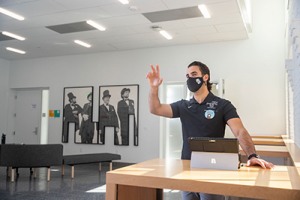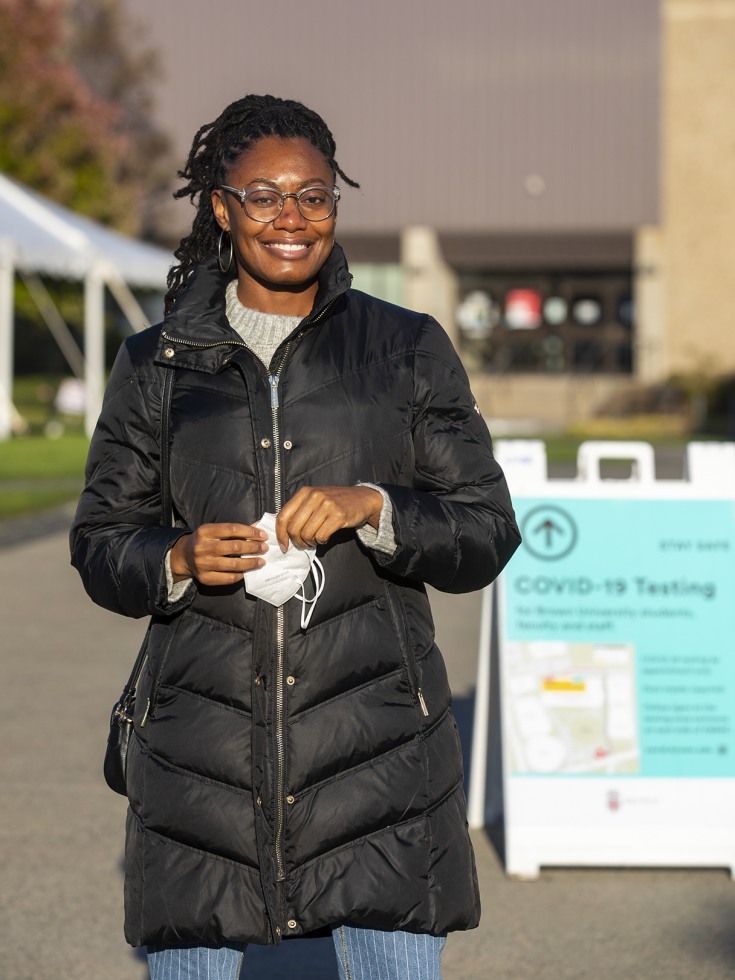PROVIDENCE, R.I. [Brown University] — In the eight months since SARS-CoV-2 first appeared on college and university campuses across the U.S., the virus has transformed higher education — perhaps most markedly by redefining what it means for students to live and learn as members of a campus community, and for faculty to teach and conduct research.
At Brown, the many changes to instruction, scholarship and student life that have unfolded since last spring have all been supported by more than 3,000 staff members who have approached the myriad challenges presented by the pandemic with flexibility, dedication and creativity — critical elements in minimizing virus spread on campus, ensuring a world-class educational experience for students and sustaining the continuity of research.
Countless staff have helped to build a comprehensive COVID-19 testing strategy that has completed 120,134 tests to date. Others are dedicated contract tracers. Employees are pitching in to implement new protocols for cleaning campus spaces or assisting faculty in creating digital content for remote courses. Many are out and about on campus, promoting healthy COVID behaviors.
"Brown is incredibly fortunate to have talented staff members who work tirelessly to deliver exceptional learning, research and campus living experiences,” said Brown President Christina H. Paxson. “This has never been more evident than over the course of the pandemic, when staff across many departments have taken on new responsibilities to keep the University thriving despite the inevitable challenges that COVID-19 has created. We are extremely grateful for their outstanding contributions.”
Many staff members have supported University efforts by participating in programs created to address specific challenges that COVID-19 presents. Roughly 70 staff members, for example, have become Healthy Ambassadors, a role in which they encourage fellow Brown community members to practice behaviors that adhere to health and safety protocols. Others from a range of departments — from Athletics to Print Services to the Office of International Programs — have participated in the Staff Temporary Project Assignment Program, which matches staff members available to help during this time of pandemic with units at Brown that need support.
But the efforts of employees have also spanned established campus departments and divisions, where staff members of all ranks have reimagined the way they fulfill their responsibilities, or temporarily taken on new roles, to meet the unique needs arising from the pandemic.
As Brown closes out a fall term and prepares to welcome more students back to campus in the spring, four staff members shared their experiences and perspectives on the ways they have redefined their roles to address the challenges presented by COVID-19.
Amber Jackson: From team travel to tracking testing
Strategic planning. Communication. Flexibility. Meticulous organization and attention to detail. These are skills that Amber Jackson calls upon regularly in her position as manager of team travel for 34 varsity teams — and hundreds of student athletes — within Brown Athletics.
These same skills made her the ideal candidate to lead Brown’s student COVID-19 testing follow-up team. Created as part of the University-wide testing and contact tracing program, this 17-member team tracks student compliance with mandatory COVID-19 testing and reaches out to those who need help meeting requirements.

